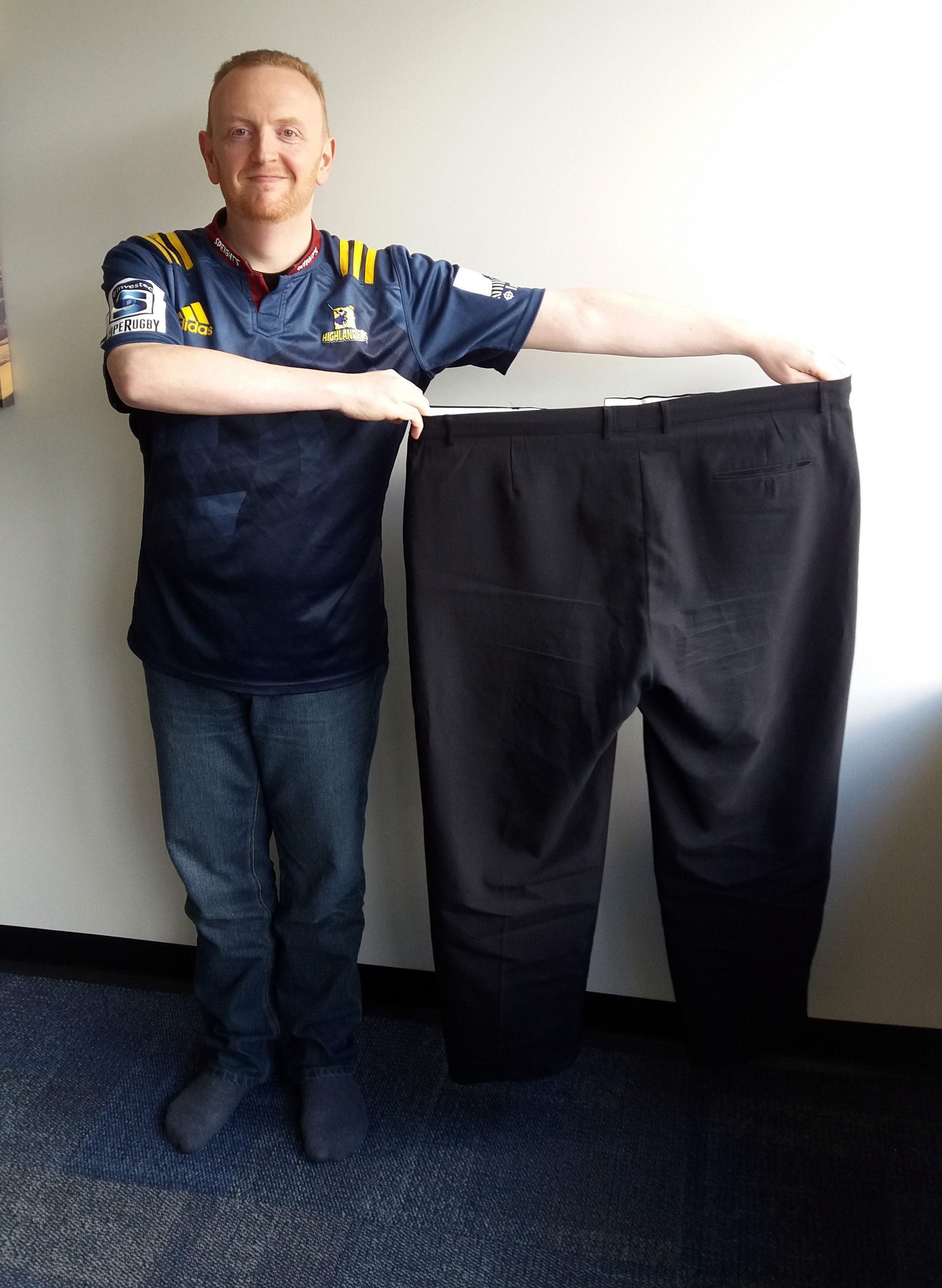
"At my worst, at my heaviest, I was 137 kilos, 302 pounds," Brendan Reid says.
"I had chronic chest pain. To tie my shoelaces I had to ... grab my stomach and shift it to one side so that I could reach around it.
"I was told, after the fact, that at that time I looked like a walking heart attack. I thought, I just have to keep trying things so that nobody can claim, if the worst were to happen, that I just sat back and allowed it to happen — ‘at least he tried’."
That was Easter, 2015.
Today, one month shy of seven years later, Reid weighs 86kg.
It is a weight the 43-year-old Dunedin software developer attained in just 15 months, after decades of obesity, merciless taunts, failed diets and feelings of shame. It is a weight he has maintained for the past five years, by going against commonly given health advice.
Otago-born and Canterbury-raised, Reid says photos of himself as a toddler show a child of ordinary proportions.
"But I have no memory of not being called out for my size. So it goes right back to primary school. You know, ‘fatty this, fatty that’."
It was not much fun, he says with staggering understatement.
"The teachers themselves were writing in their school reports, ‘Brendan needs to do something about his weight problem’."
The name calling was constant.
"That’s enough to make you want to shy away from the world. You learn to make friends with things instead of people."
Reid bought in to the idea that he was fat because there was something wrong with him.
" I wanted to be a good boy, respect my elders, do what I’m told. I went into it fully trusting ... dead keen to do whatever they said. But it just didn’t work. And then to be told ... ‘you must be lying ... you just have to try harder’ ..."

"I was convinced I wasn’t likely to live a long life ... so I thought ‘let’s just get out into the world and live what life I can hope for’."
He worked in community access radio, then studied and worked in IT, shifting south after the Christchurch earthquakes.
At one point he lost several kilos by cutting out soft drinks for a time. But failure with diets established a pattern of "just eating whatever I want, whenever I want".
"There were moments of possibility between extended periods of no hope. Nothing has worked for me so nothing will. It’s a mental trap that I fell into for a very long time."
At Easter, seven years ago, Reid’s "at least he tried" maxim spurred him to start walking to work.
During the next six months, he lost five kilos. He then decided to secretly join a gym.
"It was the biggest secret ... because when people know you’ve reached out for help it creates a sense of expectation."
The gym owner’s response shocked Brendan.
"He said, ‘there’s not much I can do for you really ... Sure, you might lose 10kg or so, but you wouldn’t sustain it ... I think we need to look at what you’re eating’."
He gave Reid information about the low-carbohydrate, high-fat Atkins diet, popular in the 1970s.
Reid resisted, not only because diets had not helped but because the consensus of opinion was that a low-carb, high-fat diet was unhealthy and did not work.
"I had a good sulk about it for a few days. Then I decided the only way I was going to prove him wrong was by trying it. And if it proves to be the end of me, that’ll teach him. If I’m going down, I’m going to take this guy with me."
During the next three months, he lost several more kilos. And the weight loss just kept happening.
In six months, Reid lost 26kg. By the end of 2016, he was below 85kg, a total weight loss of about 55kg. His body mass index had dropped from 45 (extremely obese) to 27 (a little overweight). His waist size contracted from 132cm to 87cm, allowing him to stand with both legs in one leg of the trousers that had been a snug fit less than two years previous.


Most compelling is the sight of Reid today, five years on, still on the same diet, still looking healthy, still weighing no more than he did when he was 13.
"It’s changed my life completely, in ways I never would have thought were possible," Reid says.
Whether it is called Atkins, keto or something else, there are fierce critics of low-carb, high-fat fat diets that turn the "healthy food pyramid" upside down, promoting a daily intake virtually devoid of carbs, lean on vegetables and dripping in fat. It flies in the face of common sense and increases the risk of cardiovascular disease, they say.
Reid readily admits he is not a nutritionist or a dietitian but says he has done a lot of reading on the topic and offers his own story as an example.
Tackling his hunger was key. A high-fat diet satiated his hunger, allowing him, with time, to eat less.
"For people who are struggling to simply eat less, rather than starve yourself up front, try changing what it is you’re eating and let that run its natural course."
A 2019 paper in the British Journal of Sports Medicine, by Prof Timothy Noakes, concluded that while blood cholesterol levels needed to be monitored (because they varied considerably from person to person), a low-carb, high-fat diet consistently improved all other warning signs for cardiovascular disease.
"It’s not that I’m against the energy balance model — calories in, calories out — because a lot of people can and do lose weight successfully with those approaches," Reid explains.
"But for those for whom it doesn’t work, my aim is to see low-carb included as another option among the existing suite of options."
Reid has written and self-published a book about his life and his dietary experiences, The Fat Ginger Nerd - A Weight Loss Story.
The foreword is by Prof Grant Schofield, a professor of public health at Auckland University of Technology.
"What I now know is that the simple calories in and calories out model of obesity was and is wrong," Prof Schofield writes.
"We now know that people vary in how their blood sugar and insulin respond to the exact same meal. What one person eats and seemingly has no problem with can make another fat."
Reid says the book began as a personal journal that he started when people got sick of hearing him talk excitedly about his weight-loss journey.
"It was very therapeutic for me to write.
"The hardest part for me was the last three chapters, trying to put into words the barriers to acceptance [of a low-carb, high-fat diet] and what can be done about that."
Reid does not agree the title of the book could be offensive.
"Fat, ginger, nerd was a combination of the three things I got the most grief for growing up. It’s a reference to myself."
To be told he was fat was not necessarily offensive, he says.
"Because it was factually true. Where it becomes potentially offensive is ... when people say to me I am fat in such a way that I hear, ‘You’re fat and that makes you a bad person’."
Nobody wants to be fat, Reid says.
"I can tell you, from my experience, it is not a happy place to be. What they need is advice that works for them."
Given the option of never having been overweight or not having a book to his name, Reid says he would choose not having been fat every time.
"The book is my attempt to make lemonade from a three-decade lemon. I’m not out to cause conflict. But I hope it will spark a discussion. I do hope that with the book I can shed a little light on this option, for the people who genuinely need it.
"Two-thirds of all New Zealanders are overweight and might find this useful."
After losing all that weight, Reid felt his life really began.
No longer a slave to hunger and not feeling people’s subtle, or not so subtle, rejection of him because of his weight, Reid met people, travelled in New Zealand and overseas, started discovering who he was and what he liked.
"Clothes shopping was difficult in the past because it was so hard to find things that fit.
"Now it’s so easy. For the first time in my life I have freedom to think about colours and styles and fabrics. What I like and what I don’t like.
"I have literally no fashion sense because ... I never had that freedom of choice before."
For the past two years, however, the global pandemic has clipped Reid’s wings.
"I had a little over three years of true freedom. I’m just waiting for the world to open up again so I can get on with life."
Reid says he finds it hard to quantify what effect being obese for so long had on him.
"Was I depressed? That’s hard for me to answer because it was all I had ever known. Being fat was my normal. The consequences of that was my normal."
What he can say, quite emphatically, is that his new normal is "so much better".
"The shell that had been weighing me down is gone.
"I had no idea life could be this awesome."












